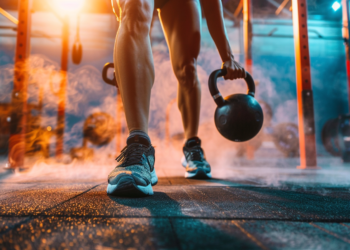You just finished a grueling CrossFit workout, pushing your limits and striving for progress. But did you know that the quality of your sleep could significantly impact your recovery and the results you see from your efforts? The relationship between CrossFit and sleep is a crucial one, influencing muscle repair, performance gains, and even your energy levels throughout the day. So, how exactly does sleep affect your CrossFit journey, and what steps can you take to optimize this vital aspect of your training routine?
Key Takeaways
- Quality sleep optimizes muscle recovery and performance gains in CrossFit.
- Adequate rest supports energy levels and boosts physical endurance for athletes.
- Consistent sleep routine enhances muscle repair and overall well-being.
- Prioritizing sleep hygiene and deep rest aids in optimal recovery and results in CrossFit.
Importance of Quality Sleep
Quality sleep plays a crucial role in optimizing physical and cognitive performance, making it an indispensable factor in achieving fitness and wellness goals. When it comes to CrossFit training, ensuring proper sleep hygiene is essential for the body's recovery process. Sleep hygiene refers to a set of practices and habits that promote healthy sleep patterns. This includes maintaining a consistent sleep schedule, creating a restful environment, and avoiding stimulants before bedtime.
During sleep, the body undergoes various processes that are vital for recovery and repair. This includes muscle growth, tissue healing, and the consolidation of memories. Without adequate sleep, these processes can be disrupted, leading to decreased performance and increased risk of injury. Research shows that individuals who prioritize quality sleep tend to have quicker recovery times, improved muscle recovery, and enhanced overall performance in physical activities like CrossFit.
Effects on Muscle Recovery
Consistently prioritizing adequate and quality sleep plays a critical role in optimizing muscle recovery post-CrossFit workouts. Your sleep patterns directly impact your body's ability to repair and rebuild muscle tissue. During sleep, especially during the deep stages of restorative rest, growth hormone secretion peaks, aiding in muscle recovery. Research has shown that individuals who consistently get 7-9 hours of quality sleep per night experience enhanced muscle recovery benefits compared to those with poor sleep patterns.
Furthermore, adequate sleep supports the release of adenosine triphosphate (ATP), which is essential for muscle contractions and overall performance during workouts. Without proper rest, your body may struggle to produce sufficient ATP, hindering your ability to push through intense CrossFit sessions and impeding muscle recovery.
Influence on Performance Gains
Adequate sleep directly influences your ability to achieve performance gains in CrossFit by impacting energy levels and muscle function. Research shows that sleep deprivation can lead to decreased performance gains and slower recovery speed in athletes. When you don't get enough sleep, your body produces less human growth hormone, which is essential for muscle recovery and growth. This can result in prolonged recovery times between workouts, ultimately hindering your overall performance gains.
To highlight the importance of sleep on performance gains and recovery speed, consider the following table:
| Factors | Impact on Performance Gains and Recovery Speed |
|---|---|
| Adequate Sleep | Supports muscle recovery and energy levels |
| Sleep Deprivation | Decreases performance gains and slows recovery |
| Human Growth Hormone | Essential for muscle growth and repair |
| Recovery Time | Shortened with adequate sleep |
| Physical Endurance | Enhanced by proper rest and recovery |
Ensuring you prioritize sleep as part of your CrossFit training regimen can significantly boost your performance gains and recovery speed, allowing you to reach your fitness goals more effectively.
Connection to Energy Levels
Optimizing sleep duration directly correlates with a noticeable increase in energy levels for CrossFit athletes. Adequate rest plays a vital role in maintaining peak performance and sustaining high energy levels throughout intense training sessions. When looking at the connection between sleep and energy levels, it becomes evident that factors such as sleep hygiene and circadian rhythm significantly impact an athlete's overall well-being and performance.
- Sleep Hygiene: Establishing a consistent pre-sleep routine and creating a sleep-conducive environment can enhance the quality of your rest, leading to improved energy levels during CrossFit workouts.
- Circadian Rhythm: Aligning your sleep schedule with your body's natural circadian rhythm can help optimize the quality of your rest, ensuring that you wake up feeling refreshed and energized for your training sessions.
- Consistent Sleep Patterns: Maintaining a regular sleep schedule, even on rest days, aids in stabilizing your energy levels and contributes to better overall performance in CrossFit activities.
Tips for Better Sleep

Establishing a regular sleep routine aligned with your body's natural rhythm is crucial for optimizing rest quality and enhancing recovery in CrossFit training. To improve your sleep quality, focus on maintaining good sleep hygiene. This includes creating a relaxing bedtime routine that signals to your body it's time to wind down. Avoiding stimulants like caffeine close to bedtime and ensuring your sleep environment is dark, quiet, and at a comfortable temperature can significantly impact your ability to fall asleep and stay asleep. Consistency in your sleep schedule is key; aim to go to bed and wake up at the same time every day, even on weekends.
Developing a bedtime routine can help signal to your body that it's time to sleep. This could involve activities like reading a book, taking a warm bath, or practicing relaxation techniques. By incorporating these practices into your nightly routine, you can enhance your sleep quality, promote recovery, and ultimately optimize your performance in CrossFit training.
Frequently Asked Questions
How Does Poor Sleep Quality Affect Crossfit Athletes' Mental Focus and Cognitive Function During Workouts?
When you don't sleep well, your mental focus and cognitive function suffer during CrossFit workouts. Poor sleep quality hampers your ability to stay sharp, impacting your performance and potentially negating the nutrition impact and training benefits you've worked hard for.
Can Incorporating a Specific Bedtime Routine Improve Sleep Quality and Recovery for Crossfit Athletes?
Incorporating a specific bedtime routine can significantly enhance your recovery process. Consistent habits before sleep, like dimming lights and avoiding screens, promote better rest, aiding muscle repair and overall performance in CrossFit.
What Role Does Sleep Play in Preventing Injuries and Promoting Overall Physical Well-Being for Crossfit Athletes?
Maintaining proper sleep hygiene is crucial for injury prevention and overall physical well-being. Recovery strategies, such as consistent bedtime routines, support optimal performance. Prioritizing quality sleep can enhance your body's ability to repair and strengthen, reducing the risk of injuries.
Are There Any Specific Sleep Tracking Devices or Apps That Are Recommended for Monitoring Sleep Patterns in Relation to Crossfit Training?
To monitor sleep patterns related to CrossFit training, consider using sleep trackers or monitoring apps like Fitbit or Oura Ring. These recovery tools offer insights into sleep hygiene, bedtime routines, cognitive function, injury prevention, nap timing, and performance enhancement.
How Does the Timing of Sleep, Such as Napping During the Day, Impact Recovery and Performance for Crossfit Athletes?
When it comes to midday napping and sleep timing, your recovery and performance can significantly improve. Studies show that strategic naps can boost cognitive function, mood, and alertness, leading to enhanced athletic outcomes.
Conclusion
In conclusion, the relationship between CrossFit and sleep is crucial for optimal recovery and performance gains. Quality sleep plays a significant role in muscle recovery, energy levels, and overall results in your fitness journey. By prioritizing rest and following tips for better sleep, you can enhance your CrossFit experience and maximize your potential. So, ensure you get those Z's to see the best results in your training regimen.













